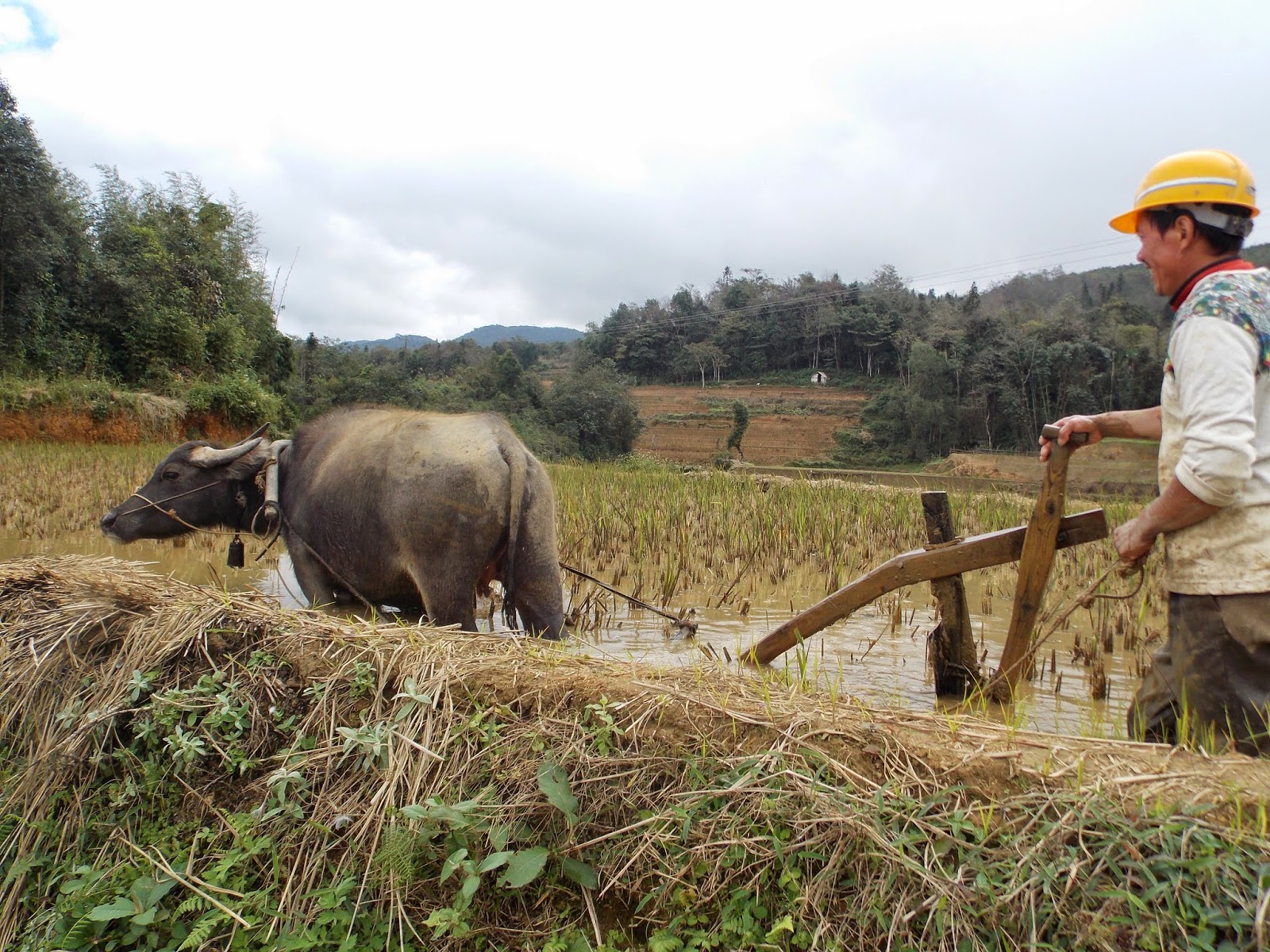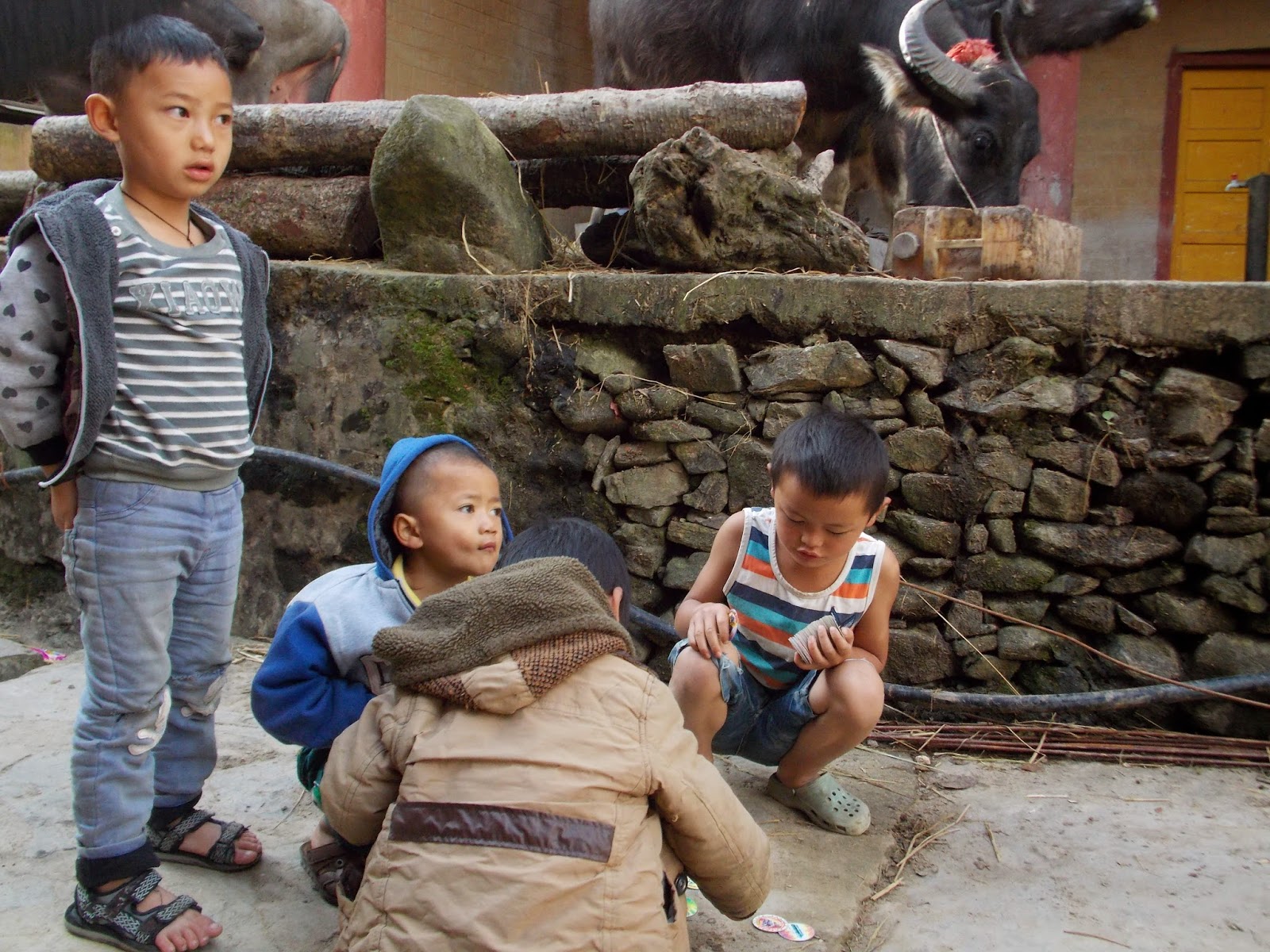Day 5: A loss for words
The day began at 5:30 a.m. in a van full of strangers: three Israelis, two Swedes, a Venezuelan and an American. By some wonder, the woman who runs the hostel we're staying in, Belinda, speaks incredible English. She has arranged for the seven foreigners staying in her hostel to have a tour of the rice terraces. However, at 5:30 a.m. her brother meets us at the hostel, and in pitch black, we drive through villages over dirt road in off road speed and it ends with him dropping us off in front of a path. We assume the path leads to the rice terraces. We follow it, with only the light of the moon as guidance. It's now 6:15 a.m. and we walk upon a balcony. Below us, we can only assume there are rice fields. We wait an hour in the dark for the the sun to rise. The moon and stars shine brightly in the pitch black sky and to the east, the sun is slowly emerging from behind the clouds. The sky slowly turns oranges and yellows behind the mound of clouds. The view is like looking at a painting. Aside from the cold temperature, I felt I could've been in a museum staring at a mural. It was so surreal.



When the sun rises as high as it will go, the rice terraces are still barely visible beneath the blanket of fog that covers our immediate vision.
We hang around for 30 minutes or so as the fog slowly creeps away and rice terraces begin to emerge to our right.
After taking a few pictures, the man who drove us emerges and asks if we're ready to go and that he'll take us to his sister now (the woman running the hostel.) The seven of us load up in the van and ride for about 20 minutes toward another area full of hostels and hotels. We arrive at Belinda's second hostel where she prepares a Chinese breakfast for us: noodles. We eat and she tells us to head down the village and we can see some more of the terraces up close.
It is still pretty foggy, but the sun is beaming down and the day is beautiful. We make our way through the village past Hani people working hard, Hani children playing games in the streets and pigs in pins in yards.
The fields are foggy and we can only see three to four directly in front of us. I have spent the entire day spouting out adjectives with Aicia to try and find the words to describe this place, but we come up empty in every language each time. The only way to grasp even a quarter of what we saw is to show pictures. To fully obtain the worth of its beauty, you need to book a trip to Yuanyang and see it for yourself!
 |
| View from Belinda's Hostel |




 |
| Below the village |
 |
| The fog comes and goes all day, but the sun is trying to shine! :) |



We walk around the terraces and enjoy the view, even through the mist. Once we reach the top, back at the hostel, Belinda loads us in the van for the grand tour. Belinda's daughter, Eilene joins for the ride. She is quite the character for a four-year-old. She knows little English, Belinda has Just begun teaching her two months ago. Eilene is an instant hit with everyone. We all quickly adopt her and spend the day entertaining and admiring her.
Eilene rides shotgun in my lap for the day as we ride around to the different terraces and villages.
At the first stop she brings back two tiny pieces of hay and places it abover her upper lip and does a kiss face creating a mustache with the straw. She hands me the second straw and I politely follow her lead. We repeat this for the 15-minute ride to the next stop. I am in love with her instantly. We make the next stop, and since it's too foggy for photographs, the others all make mustache, kiss faces with Eline and the sticks.
We're back in the car and she's still entertained by mustache kiss faces, but soon she begins singing "xiaoping guo," and my heart melts. (xiaoping guo is an obnoxiously catchy and famous Chinese song everyone knows, including the foreigners. https://www.youtube.com/watch?v=YZaDQ6Yc8P8 .
) I join in singing with her, of course. She realizes I only know the first few words of the chorus and slows down and waits for me to repeat her the next time I sing along.
After this and the next stop, Eline and I are in the front seat again. I pretend to fall asleep and she blows in my face and I jolt awake. She gestures for me to repeat this by pointing at the window and then me and shutting her eyes. I do as she wishes and pretend to snore and every 15 seconds she blows the hair in my face and I jolt awake completely surprised.
From here on out, she waits for me if I fall behind from taking photos. She comes to me with her hand extended. She trusts me and now we are friends.



 |
| Eline picked me some wildflowers <3 |
When we arrive at Large Fishpond Folk Village, Eline and I dart down the stone path. Belinda has no worries she is with me. Eline and I turn to the others and say "kuai dian er," which is "quickly" in Chinese.
The others make it to the bottom and we all wander down toward more rice terraces. This place is the most beautiful place we've seen the entire day and it's noon now. The fog is finally beginning to clear and the terraces are visible in multitudes and not just three or four feet in front of you.
The stone path down the terraces is surrounded by water flowing on either side. The irrigation system these farmers have created is incredible. This entire people, landscape and lifestlye can not be put into words.
We take more photos of what we've been waiting all day to see: the clear blue sky reflected in the paddies of rice. The endless rows of paddies extending all the way into the valley.
We made our way back to the village and sat for lunch. Belinda does the ordering and the seven foreigners, Belinda and Eline enjoy a lunch of fresh cooked vegetables and purple rice.
When we finish lunch we venture to yet another famous terrace, Bada. The fog has cleared almost entirely and none of us can believe our eyes. The terraces extend for miles in all directions. We walk down the path created taking photos and admiring the majestic beauty that surrounds us and the way the sunlight hits the paddies.
We stop to video and photograph a man working with the water buffalo. The Hani use the water buffalo to wad through the paddies as they follow behind with a tiller. The paddies are mud and water so the buffalo are strong enough to pull the equipment used for tilling the soil. This type of farming has not been done in America in ages. Farming is still hard work where I'm from, but the equipment is far more advanced and industrialized. The things I saw today I find difficult to blog about because I honestly can't find the words to use.
 |
| In case you can't tell, I'm scared to death here. There is nothing stopping us from sliding and falling over this cliff! :/ |
 |
| The crew from left to right: Patrick & Eline. Barack, Tuber, Roi. Me and Alicia. :) |
 |
| The sun's reflection :) |

We made our way back to the top, passing a family's hut with clothes drapped across hay and the levees of the paddies to dry. We moved to the next and last village: Quinko.
This village was about a mile down a curved stone road. We thought we'd never reach it, but alas we stumble upon a very unique village. The Quinko Village has clearly embraced tourism, wheras many of the previous villages had not. Quinko had a museum at the end of their village for tourists. As we walked through the village, no more than a half mile from start to finish, we walked across lunchtime. The entire population of farmers were gathered around tables in numbers of six and seven eating lunch. The women sat together at one end and the men sat together on the other end. A woman grabbed my arm and extended a bowl of rice to me. I politely declined by saying, "I don't want. I'm full. Thank you," in Chinese. Many of them were saying hello; in English and in Chinese. Children roamed unattended by adults and no one cared. This place was a postcard for village life.







We hiked back up the mile-long stone path and headed back toward the hostel. Eline had fallen asleep while we were gone. I scooped her up and held her in my arms until we arrived, and then I carried her into the hostel office and placed her on the couch.
We paid 80 for the days tour and all sat around the office for a beer and a wind down. It had been a beautiful day and we'd made five new friends by the end of it. The Israeli boys would travel a month in Vietnam starting the next day and the Sweedish couple would continue through Asia for two more months. Alicia and I said goodbye, showered and caught another sleeper bus to Kunming. The next morning we'd go from one bus station to the next to reach our next destination: The Old Town of Dali.
 |
| Belinda's husband (Chinese name only) |
 |
| (: The whole lot :) |































































